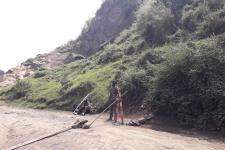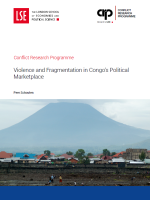Congo’s political marketplace

After nearly three decades of continuing armed conflict, it is safe to say that violence is not an aberration to politics but that it is an integral part of how politics is conducted in eastern Congo. Over the past ten years, the number of rebel groups has multiplied by a factor of ten, in a choreography of endless schisms, shifting alliances and temporary mobilizations — and there’s no indication that this will end anytime soon. These patterns aren’t an indication of transient or under-developed politics, but reflect the vibrancy of a violent political dynamic of which rebels are an integral part.
Commissioned by the London School of Economics’ Conflict Research Programme, this report explores the relations between political dynamics on the national level and in the east. It analyzes the historical evolution and properties of the Congo’s political economy of conflict and testing a political marketplace lens—an approach that foregrounds how the conduct of elites mirrors that of firms competing in a marketplace.
From to this perspective, DIIS researcher Peer Schouten, lead author for the study, Congo is best understood as a complex amalgamation of relatively autonomous but nonetheless interlocking and embedded political marketplaces.
As a result, whereas the national political marketplace centered on Kinshasa today forms one key marketplace, eastern Congo forms a segmented violent political marketplace which stretches across national borders and is in turn home to more localized nested markets.
In each of these political markets, armed groups and violence play a different role, and we examine how these political markets mutually influence each other.
Fragmentation also means a higher variety of factors that drive conflict: dynamics from one place to the next can be radically different. It might be that a relatively stable political bargain is in place in one area, but that a nearby area is subject to instability in dynamics which seem to obey their own marketplace logic.
‘Rather than looking for discrete actors along formal institutional lines’, says Schouten, ‘this means we have to enquire how power in Congo is distributed through dynamic networks that straddle different political marketplaces, internal and external borders, as well as state-society and traditional-modern divides’. The report argues that by examining these networks, the way they are formed, compete and collude, and around what resources they revolve, we can come to terms with the contours of Congo’s highly fragmented political marketplace. The question then is how these networks try to build their power and how these compete, which resources they mobilize, and eventually, how they shape politics at large.
DIIS Eksperter

